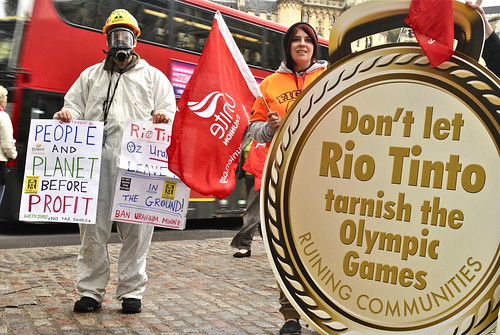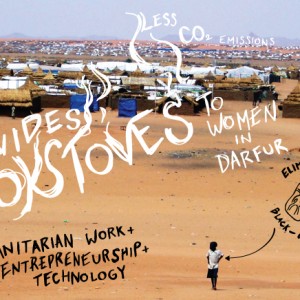Meddling With the Environment Puts Rio Tinto on Mock Olympic Podium
Environmentalists and workers’ unions are angry that Rio Tinto, one of the world’s largest mining companies, has been chosen to supply the 2012 Olympic medals.

Just one week before the start of the 2012 Olympic Games, protesters staged a demonstration in London’s Trafalgar Square to award the Games’ sponsors mock medals for the worst environmental and humanitarian performances. Topping the podium was Rio Tinto, a multi-national mining company based in both the United Kingdom and Australia, that will be supplying the real medals for this year’s Olympics. It was followed by Dow Chemical and BP.
Rio Tinto is unpopular among environmental activists and union workers, two interest groups that have staged campaigns aimed at forcing the International Olympic Committee (IOC) to source the medals elsewhere.
United Steelworkers, the largest industrial union in the US and Canada, is spearheading the “Off the Podium” campaign. The organization cites worker lockouts and anti-union policies, as well as environmental and humanitarian transgressions, as reasons to find a new supplier for the medals at London’s Games.
Greenwash Gold, the group that staged the mock awards ceremony in London, says that Rio Tinto is using huge quantities of water at its desert Oyu Tolgoi mine in Mongolia, and has spilled radioactive water at its Australian mines. The company is also accused of polluting water sources at its Bingham Canyon mine near Salt Lake City, Utah, and is involved with the controversial Eagle mine near Lake Superior in Michigan’s Upper Peninsula.
The company insists it is committed to the environment and the communities where it works: “We run our business to very high ethical standards and are committed to running our mines responsibly. We aim to bring long-lasting, positive social, economic and environmental benefits to the communities, regions and countries where we work,” states the Rio Tinto website.
Thanks to a global boom in prices for gold and other metals, mining has been popping up in the news a lot lately, including here on Circle of Blue. I wrote a piece about gold mining last month, and have been following the conflict surrounding the Conga gold project in Peru. You can read more here. (On a side-note, you can now track stories about mining, deforestation, and fires across the Amazon Basin using a new, interactive tool called Infoamazonia.)
Do you think Rio Tinto—or other corporate sponsors of the Games—should be allowed to be involved with the world’s “greenest Olympics”? Let us know! Contact Codi Yeager
A news correspondent for Circle of Blue based out of Hawaii. She writes The Stream, Circle of Blue’s daily digest of international water news trends. Her interests include food security, ecology and the Great Lakes.
Contact Codi Kozacek







Leave a Reply
Want to join the discussion?Feel free to contribute!